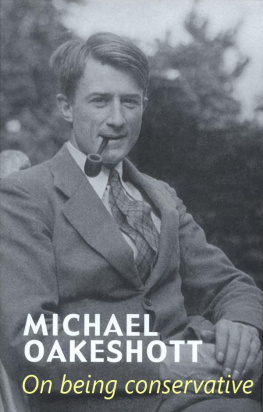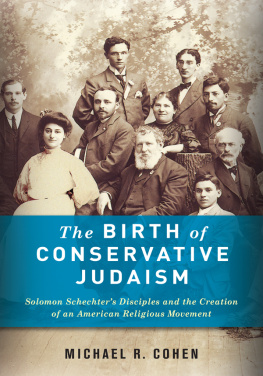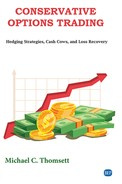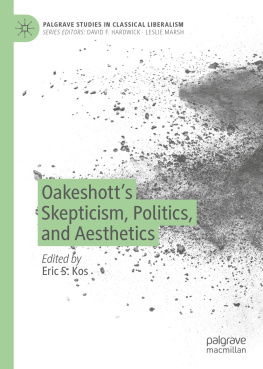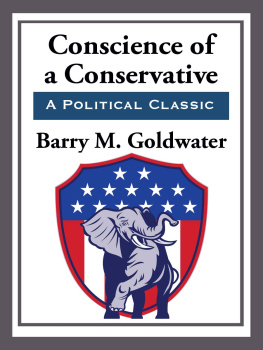Michael Oakeshott - On Being Conservative
Here you can read online Michael Oakeshott - On Being Conservative full text of the book (entire story) in english for free. Download pdf and epub, get meaning, cover and reviews about this ebook. genre: Art. Description of the work, (preface) as well as reviews are available. Best literature library LitArk.com created for fans of good reading and offers a wide selection of genres:
Romance novel
Science fiction
Adventure
Detective
Science
History
Home and family
Prose
Art
Politics
Computer
Non-fiction
Religion
Business
Children
Humor
Choose a favorite category and find really read worthwhile books. Enjoy immersion in the world of imagination, feel the emotions of the characters or learn something new for yourself, make an fascinating discovery.
- Book:On Being Conservative
- Author:
- Genre:
- Rating:3 / 5
- Favourites:Add to favourites
- Your mark:
- 60
- 1
- 2
- 3
- 4
- 5
On Being Conservative: summary, description and annotation
We offer to read an annotation, description, summary or preface (depends on what the author of the book "On Being Conservative" wrote himself). If you haven't found the necessary information about the book — write in the comments, we will try to find it.
On Being Conservative — read online for free the complete book (whole text) full work
Below is the text of the book, divided by pages. System saving the place of the last page read, allows you to conveniently read the book "On Being Conservative" online for free, without having to search again every time where you left off. Put a bookmark, and you can go to the page where you finished reading at any time.
Font size:
Interval:
Bookmark:
OnBeing Conservative
By Michael Oakeshott
Taken from: http://www.geocities.com/Heartland/4887/conservative.html
The common belief that it is impossible(or, if not impossible, then so unpromising as to be not worth while attemptingto) to elicit explanatory general principles from what is recognized to beconservative conduct is not one that I share. It may be true that conservativeconduct does not readily provoke articulation in the idiom of general idea, andthat consequently there has been a certain reluctance to undertake this kind ofelucidation; but it is not to be presumed that conservative conduct is lesseligible than any other for this sort of interpretation, for what it is worth.Nevertheless, this is not the enterprise I propose to engage in here. My themeis not a creed or a doctrine, but a disposition. To be conservative is to bedisposed to think and behave in certain manners; it is to prefer certain kindsof conduct and certain conditions of human circumstances to others; it is to bedisposed to make certain kinds of choices. And my design here is to construethis disposition as it appears in contemporary character, rather than totranspose it into the idiom of general principles.
The general characteristics of thisdisposition are not difficult to discern, although they have often beenmistaken. They centre upon a propensity to use and to enjoy what is availablerather than to wish for or to look for something else; to delight in what ispresent rather than what was or what may be. Reflection may bring to light anappropriate gratefulness for what is available, and consequently theacknowledgment of a gift or an inheritance from the past; but there is no mereidolizing of what is past and gone. What is esteemed is the present; and it isesteemed not on account of its connections with a remote antiquity, nor becauseit is recognized to be more admirable than any possible alternative, but onaccount of its familiarity: not, Verweile doch, du bist so schon, but Stay withme because I am attached to you.
If the present is arid, offering littleor nothing to be used or enjoyed, then this inclination will be weak or absent;if the present is remarkably unsettled, it will display itself in a search fora firmer foothold and consequently in a recourse to and an exploration of thepast; but it asserts itself characteristically when there is much to beenjoyed, and it will be strongest when this is combined with evident risk ofloss. In short, it is a disposition appropriate to a man who is acutely awareof having something to lose which he has learned to care for; a man in somedegree rich in opportunities for enjoyment, but not so rich that he can affordto be indifferent to loss. It will appear more naturally in the old than in theyoung, not because the old are more sensitive to loss but because they are aptto be more fully aware of the resources of their world and therefore lesslikely to find them inadequate. In some people this disposition is weak merelybecause they are ignorant of what their world has to offer them: the presentappears to them only as a reside of inopportunities.
To be conservative, then, is to preferthe familiar to the unknown, to prefer the tried to the untried, fact tomystery, the actual to the possible, the limited to the unbounded, the near tothe distant, the sufficient to the superabundant, the convenient to theperfect, present laughter to utopian bliss. Familiar relationships andloyalties will be preferred to the allure of more profitable attachments; toacquire and to enlarge will be less important than to keep, to cultivate and toenjoy; the grief of loss will be more acute than the excitement of novelty orpromise. It is to be equal to ones own fortune, to live at the level of onesown means, to be content with the want of greater perfection which belongs aliketo oneself and ones circumstances. With some people this is itself a choice;in others it is a disposition which appears, frequently or less frequently, intheir preferences and aversions, and is onto itself chosen or specificallycultivated.
Now, all this is represented in acertain attitude towards change and innovation; change denoting alterations wehave to suffer and innovation those we design and execute.
Changes are circumstances to which wehave to accommodate ourselves, and the disposition to be conservative is boththe emblem of our difficulty in doing so and our resort in the attempts we maketo do so. Changes are without effect only upon those who notice nothing, whoare ignorant of what they possess and apathetic to their circumstances; and theycan be welcomed indiscriminately only by those who esteem nothing, whoseattachments are fleeting and who are strangers to love and affection. Theconservative disposition provokes neither of these conditions: the inclinationto enjoy what is present and available is the opposite of ignorance and apathyand it breeds attachment and affection. Consequently, it is averse from change,which appears always, in the first place, as deprivation. A storm which sweepsaway a copse and transforms a favorite view, the death of friends, the sleep offriendship, the desuetude of customs of behavior, the retirement of a favoriteclown, involuntary exile, reversals of fortune, the loss of abilities enjoyedand their replacement by others these are changes, none perhaps without itscompensations, which the man of conservative temperament unavoidably regrets.But he has difficulty in reconciling himself to them, not because what he haslost in them was intrinsically better than any alternative might have been orwas incapable of improvement, nor because what takes its place is inherentlyincapable of being enjoyed, but because what he has lost was something heactually enjoyed and had learned how to enjoy and what takes its place issomething to which he has acquired no attachment. Consequently, he will findsmall and slow changes more tolerable than large and sudden; and he will valuehighly every appearance of continuity. Some changes, indeed, will present nodifficulty; but, again, this is not because they are manifest improvements butmerely because they are easily assimilated: the changes of the seasons aremediated by their recurrence and the growing up of children by itscontinuousness. And, in general, he will accommodate himself more readily tochanges which do not offend expectations than to the destruction of what seemsto have no ground of dissolution within itself.
Moreover, to be conservative is notmerely to be averse from change (which may be an idiosyncrasy); it is also amanner of accommodating ourselves to changes, an activity imposed upon all men.For, change is a threat to identity, and every change is an emblem ofextinction. But a mans identity (or that of a community) is nothing more thanan unbroken rehearsal of contingencies, each at the mercy of circumstance andeach significant in proportion to its familiarity. It is not a fortress intowhich we may retire, and the only means we have of defending it (that is,ourselves) against the hostile forces of change is in the open field of ourexperience; by throwing our weight upon the foot which for the time being ismost firmly placed, by cleaving to whatever familiarities are not immediatelythreatened and thus assimilating what is new without it becoming unrecognizableto ourselves. The Masai, when they were moved from their old country to thepresent Masaid reserve in Kenya, took with them the names of their hills andplains and rivers and gave them to the hills and plains and rivers of the newcountry. And it is by some such subterfuge of conservatism that every man orpeople compelled to suffer a notable change avoids the shame of extinction.
Changes, then, have to be suffered; anda man of conservative temperament (that is, one strongly disposed to preservehis identity) cannot be indifferent to them. In the main, he judges them by thedisturbance they entail and, like everyone else, deploys his resources to meetthem. The idea of innovation, on the other hand, is improvement. Nevertheless,a man of this temperament will not himself be an ardent innovator. In the firstplace, he is not inclined to think that nothing is happening unless greatchanges are afoot and therefore he is not worried by the absence of innovation.Further, he is aware that not all innovation is, in fact, improvement; and hewill think that to innovate without improving is either designed or inadvertentfolly. Moreover, even when an innovation commends itself as a convincingimprovement, he will look twice at its claims before accepting them. From hispoint of view, because every improvement involves change, the disruptionentailed has always to be set against the benefit anticipated. But when he hassatisfied himself about this, there will be other considerations to be takeninto account. Innovating is always an equivocal enterprise, in which gain andloss (even excluding the loss of familiarity) are so closely interwoven that itis exceedingly difficult to forecast the final up-shot: there is no such thingas an unqualified improvement. For, innovating is an activity which generates notonly the improvement sought, but a new and complex situation of which this isonly one of the components. The total change is always more extensive than thechange designed; and the whole of what is entailed can neither be foreseen norcircumscribed. Thus, whenever there is innovation there is the certainty thatthe change will be greater than was intended, that there will be loss as wellas gain and that the loss and the gain will not be equally distributed amongthe people affected; there is the chance that the benefits derived will begreater than those which were designed; and there is the risk that they will beoff-set by changes for the worse.
Next pageFont size:
Interval:
Bookmark:
Similar books «On Being Conservative»
Look at similar books to On Being Conservative. We have selected literature similar in name and meaning in the hope of providing readers with more options to find new, interesting, not yet read works.
Discussion, reviews of the book On Being Conservative and just readers' own opinions. Leave your comments, write what you think about the work, its meaning or the main characters. Specify what exactly you liked and what you didn't like, and why you think so.

